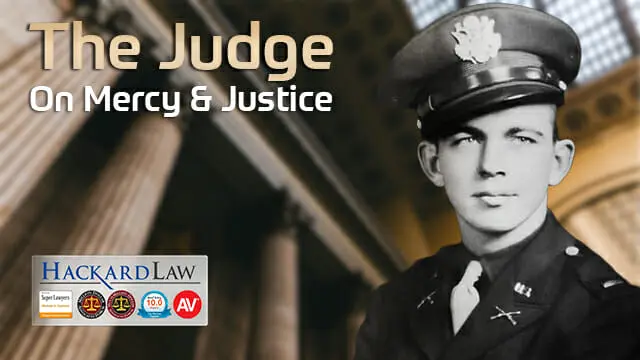
The Judge | On Mercy and Justice
He was a war hero, an assistant district attorney, a public defender and later a judge. He was also politically incorrect – far before there was a name for it.
I first met the “judge” when I was 17. I was working at the local gas station pumping gas, cleaning windows and checking oil. In those days it was illegal for motorists to pump their own gas.
The effects of this law were to provide unskilled jobs for high school kids at $1.05 an hour – a time when the cost of a first-class stamp was a nickel.
The judge’s visits to the gas station would put a smile on our faces. He always had a story, asked us questions and listened to our answers. He was unlike most customers – even courteous customers – he showed humor and had a nickname for all of us.
The judge told me that I should be a lawyer – in his words – “kid, you should be a lawyer.” He didn’t say why he thought that, and I must admit that I didn’t know why he said it. Still, he said, “kid, you should be a lawyer.”
I went on from my time at the gas station, went to college, and would occasionally run into the judge at the local grocery store. Even at those chance meetings he said, “kid, you should be a lawyer.” I remember telling him that I was going to get an MBA. His response, “that and 10 cents will get you a cup of coffee. You go to law school and I’ll hire you.”
Well, I did go to law school, and in the middle of my second year, I ran into the judge at the same store.
I told him that I was in law school, reminded him of what he said, and he told me to come down to the court the next day.
I did and waited for his criminal calendar to end. He called me back to his chambers, walked me upstairs to the court administrator, and told the court administrator to hire me. The court administrator told him, “judge, I’m out of budget.” The judge responded – “I guess that you didn’t hear what I said, hire him.” The administrator knew what he had to do – “okay, Judge, I’ll find a way.”
The judge walked me out and told me that “I’d better not make a monkey out of him.” I didn’t.
After about a year on the job I was promoted to head the court’s legal research office for the time between my law school graduation and my first job as a lawyer. I learned a lot of things from the judge. One thing stands out.
I remember making self-righteous comments about the criminal defendants in his court – he took me aside and said, “there but for the grace of God go you or I.” He didn’t explain; he didn’t need to. It made me think. I’ve had all the advantages of family, faith, education and health. I didn’t earn these advantages, and nearly all the defendants in the judge’s court did not have similar advantages. The message of “there but for the grace of God go you or I” somehow resonates every time I’m tempted to feel self-righteous or superior.
People in the judge’s court, whether defendants, attorneys, witnesses or staff were treated in a way – much like I was as a 17-year-old gas station attendant – with a kind of humorous respect and a kind of camaraderie, an understanding of our common human condition. The judge knew how to talk to us – he didn’t put on airs and we knew that it wasn’t an act.
So now, almost 50 years later, when I find it too easy to judge others – I remember the judge, his rough kindness, and his words, “there but for the grace of God go you or I.” I realize that they shouldn’t just be words. They should affect our behavior, in how we treat others.

 (916) 775-8542
(916) 775-8542